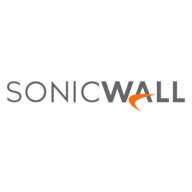


SonicWall NSa and Check Point NGFW are advanced network security solutions. SonicWall NSa has an edge with competitive pricing and robust support, ideal for companies focused on cost efficiency. Check Point NGFW, with its superior feature set, appeals to organizations seeking advanced capabilities.
Features: SonicWall NSa provides secure mobile access, deep packet inspection, and content filtering. Check Point NGFW offers advanced threat prevention, seamless cloud service integration, and detailed threat intelligence analytics, making it a holistic security solution.
Room for Improvement: SonicWall NSa could enhance its threat intelligence depth and expand its integration with third-party applications. Improving mobile usability and offering more comprehensive training resources would be beneficial. Check Point NGFW can focus on improving deployment simplicity, reducing resource usage on detailed logging, and streamlining management to match pace with rapid updates.
Ease of Deployment and Customer Service: SonicWall NSa impresses with its straightforward deployment and responsive support, ideal for those requiring minimal setup complexity. Check Point NGFW, despite a more complex setup due to its advanced capabilities, provides extensive support resources that reassure during the onboarding process.
Pricing and ROI: SonicWall NSa's lower setup cost offers quick ROI, making it budget-friendly for standard needs. Check Point NGFW justifies its higher cost through long-term value from its advanced security features, appealing to businesses requiring top-tier security solutions.
Clients are now comfortable and not wasting productive hours on IT support.
We have experienced a positive return on investment by utilizing Fortinet's products.
There's definitely an ROI. Having a centralized way of managing and applying policies across the entire organization always helps.
This is a time-saving measure because we don't need to deploy a cluster or a firewall each time; we just create a virtual system on the management server using the same appliance.
Incident response time has reduced significantly, and downtime due to network issues has been minimized, leading to an improved return on investment.
He explained that it required a command line configuration, as it couldn't be done through the graphical user interface.
I would rate their support for FortiGate a nine out of ten.
They offer very accurate solutions.
The support team we engaged was knowledgeable and well-versed with the application.
We have escalated issues to Check Point technical support multiple times and have received timely and very good responses.
Even challenging issues like those with VPNs have been resolved efficiently with their help.
The support from SonicWall was excellent.
SonicWall support is very helpful and responsive.
They scale up really well from smaller models like the FortiGate 40 and 50 to bigger sites with the FortiGate 100 for more throughput - up to enterprise datacenters.
The variation comes in terms of the interfaces and throughputs, but from a security perspective, you get the same benefit, irrespective of whether you have an entry-level unit or an enterprise.
You can choose a cheaper model if you only have 20-30 users, but you will need to spend more money for a FortiGate solution that covers 5,000.
If specified correctly, even the smaller boxes offer high session and bandwidth rates, making the solution highly scalable, even up to telco-level requirements.
Scalability must be carefully planned for, considering future growth and user base increases.
They offer multiple solutions from SMBs to enterprise data centers, making it an easily scalable solution with no issues in scalability.
I would rate its scalability around eight out of ten, meaning there are no issues, and it is pretty easy to scale.
Improper handling of these can lead to a memory surge, a well-known bug that can cause the entire system to freeze.
We have not had any problems with the operating systems or maintenance of subscriptions.
The solution is very stable.
While the solution is generally stable, there are complications, such as requiring SmartConsole for deployment and upgrades, which can be time-consuming.
I have worked with Check Point products for 15 years and haven't found any stability or performance issues.
The use of Check Point firewalls has helped improve our security posture without any downtime.
The stability of SonicWall NSA is quite good.
If I have put 10 GBPS of throughput on a firewall and I enable all of these features available, such as IPS or UTM functionalities, the throughput comes down to 1 GBPS.
By providing an integrated solution, users would have access to all features and functionalities within a single window, eliminating the need to navigate through multiple windows.
Investing in a solution that can accommodate such growth would be more cost-effective than repeatedly purchasing new hardware.
Other products, like FortiGate, are perceived as more intuitive because they are easier to configure from the start.
More granularity and control for threat prevention, especially on the OT side, would be beneficial.
Check Point would benefit from having a single console for both basic and policy configurations.
More details in the analytical tools offered would be appreciated since it is not yet mature.
There are some aspects of the dashboard configuration or customization that could be improved.
Secure SD-WAN is free of charge.
The most expensive part is the renewal of the license subscription.
FortiGate is priced lower than Palo Alto.
In comparison to Fortinet and other products, the pricing may be considered high.
Compared to other solutions, the pricing of Check Point NGFW is high.
The perception is that Check Point NGFW is expensive, especially when all software modules are included.
SonicWall is much cheaper compared to Fortinet, particularly regarding renewal and licensing costs.
I would rate the price of the product as seven out of ten.
The firewall, IPS, and VPN functions are the most valuable features.
FortiGate provides solid protection against viruses, malware, and other threats.
Within the same dashboard, you get to see the security profiles, the type of traffic that's passing through, the top applications that are being consumed, etc.
The firewall's default behavior of blocking all traffic, including a cleanup rule that blocks everything from external to internal sources, is highly valuable for protecting our network.
The most valuable features in my experience include perimeter firewalling, cloud and mobile security, application control, URL filtering, DLP, threat prevention, intrusion protection, and safeguarding against malware, botnets, and zero-day attacks.
Since implementing it, we have noticed a lot less getting through that maybe other antivirus within firewalls had failed to catch.
Real-time deep memory inspection is very helpful and has had a positive impact on our security posture.
SonicWall NSA's most valuable features are its SD-WAN and a system RTBI that blocks all attacks.



Fortinet FortiGate offers comprehensive network security and firewall protection across multiple locations. It effectively manages data traffic and secures environments with features like VPN, intrusion prevention, and UTM controls.
Organizations rely on Fortinet FortiGate for its robust integration with advanced security policies, ensuring significant protection for enterprises, cloud environments, and educational sectors. It facilitates network segmentation, application-level security, and authentication management, securing communication within and between locations such as branches and data centers. Its efficient SD-WAN and UTM features enable streamlined data management and enhanced threat protection capabilities. Users appreciate its centralized management, facilitating seamless operations across diverse environments.
What are the key features of Fortinet FortiGate?
What benefits should users expect from Fortinet FortiGate?
Fortinet FortiGate is crucial in sectors like education, offering robust networks for secure data flow between campuses and facilitating remote learning. In enterprise environments, it allows efficient management of application traffic and security across multiple branches, while in the cloud, it seamlessly integrates with diverse platforms to enhance security infrastructure.
Check Point NGFW provides comprehensive firewall protection, managing VPNs, and securing network perimeters with advanced threat prevention techniques. It's widely used to protect businesses, data centers, and ensure secure traffic management.
Check Point NGFW offers robust security for companies, delivering security features like threat prevention, URL filtering, and intrusion prevention across both layer 3 and layer 7. It supports remote access, web filtering, application control, and safeguards against malware, botnets, and zero-day attacks. With its intuitive management console, deep packet inspection, centralized management capabilities, and sophisticated threat detection, Check Point NGFW enhances network security and productivity. The system integrates seamlessly with other technologies and provides real-time monitoring, detailed reporting, and automated policy management. Additionally, its setup is straightforward, it scales well, and offers comprehensive logging.
What are the key features?
What are the benefits?
Check Point NGFW is implemented in industries like finance, healthcare, and retail, where protecting sensitive data and ensuring compliance are critical. Its advanced security features and ease of management make it suitable for large enterprises and data centers, ensuring reliable and secure network operations.
SonicWall NSa dispenses advanced threat protection using a high-performance security platform. The NSa series implements intuitive deep learning technologies in the SonicWall Capture Cloud Platform to dispatch the automated real-time threat detection and deterrence enterprise organizations need today. SonicWall Network Security appliance (NSa) series is best for mid-sized organizations to distributed enterprises and data centers.
SonicWall NSa series next-generation firewalls (NFGWS) combine two very robust security ideologies to deliver advanced threat protection to keep users’ networks safe. Boosting SonicWall’s multi-engine advanced threat protection (ATP) is their Real-time Deep Memory Inspection (RTDMI™). The RTDMI intuitively identifies and stops aggressive zero-day threats and vicious malware by investigating memory directly. This real-time process allows SonicWall RTDMI to be accurate, lessen false positives and discover and alleviate malicious threats and attacks. SonicWall’s single-pass Reassembly-Free Deep Packet Inspection (RFDPI) will audit every byte of each and every packet by investigating both outbound and inbound traffic on the firewall. By combining the SonicWall Capture Cloud Platform along with on-box offerings such as intrusion prevention, web/URL filtering, and anti-malware, the NSa series is able to block the most malicious and dangerous threats at the gateway.
Additionally, SonicWall firewalls supply absolute protection by executing complete inspection and decryption of SSH and TLS/SSL encryption connections - no matter the port or protocol. The firewall takes a deep dive into each and every packet (the header and data) routing out any anomalies, zero-day intrusions, threats, and protocol non-compliance. Users can also define unique criteria specific to their organization to ensure their networks remain safe. This aggressive deep packet inspection is able to identify and block malicious attacks, stop dangerous malware downloads, prevent the spread of infections, and defeat command and control (C&C) communications and data exfiltration. Protocols involving inclusion and exclusion allow users complete control to decide, based on specific governance policies, organizational policies, or government or legal compliance, which traffic is to be investigated for decryption or inspection.
SonicWall Nsa offers enterprise organizations the network control and fluid flexibility they desire using an intrusion prevention system (IPS), VPN, real-time visualization, and other advanced powerful security features, making it a popular firewall solution in today's marketplace.
Reviews from Real Users
“The features that I have found most valuable are the firewalling, which is very good, and the GUI which is very intuitive. It is easy to use and provides great security.” - Network Engineer at a maritime company
“What's valuable in SonicWall NSa is the ATP (advanced threat protection). It can protect users from malicious links. SonicWall NSa also has a Sandboxing service that is very helpful for us, especially when end users accidentally click on malicious links. Another valuable feature of this solution is that it is very useful for site-to-site VPN connectivity issues. SonicWall NSa has very good hardware. I also love that SonicWall has very good technical support, who are very knowledgeable, provide good suggestions, and they're easy to reach.” - Mohammed M., Network Administrator at Transgulf Readymix
We monitor all Firewalls reviews to prevent fraudulent reviews and keep review quality high. We do not post reviews by company employees or direct competitors. We validate each review for authenticity via cross-reference with LinkedIn, and personal follow-up with the reviewer when necessary.